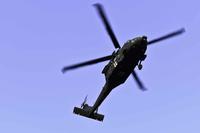The Taliban claimed Friday that it has made sweeping advances and now controls 85% of Afghanistan as the U.S. military enters its final phase of withdrawal.
During a news conference in Russia, Taliban leaders boasted that the group controls about 250 of the 398 districts in Afghanistan, according to Agence France-Presse.
Shahabuddin Delawar, a negotiator for the Taliban, said the group is not planning to take provincial capitals by force. But when the Taliban reached an agreement in February 2020 to pave the way for the U.S. withdrawal, it did not promise it wouldn't attack administrative centers, he clarified.
Read Next: Marine Corps Lets Fully Vaccinated Marines Stop Wearing Masks
The Taliban's claims of vast territorial gains could not be independently verified. But reports continue to emerge from Afghanistan of the group's advances, which threaten the stability of the Afghan government in Kabul.
Earlier this week, Tajik officials said that more than 1,000 Afghan soldiers fled into Tajikistan, which sits on Afghanistan's northeast border, to escape heavy fighting with the Taliban. The BBC reported that it was the fifth time Afghan soldiers -- nearly 1,600 in all -- had crossed the border in two weeks.
According to an AFP report, the Taliban claimed it had seized control of Islam Qala, a major border crossing to Iran through which Afghanistan conducts a great deal of trade.
And while the Pentagon on Thursday touted the firepower the Afghan air force provides as Kabul fights back, the Taliban appear to be trying to neutralize that advantage. Reuters reported Friday that at least seven Afghan pilots have been assassinated off base in recent months, possibly by Taliban agents.
Pentagon Press Secretary John Kirby said during a briefing Thursday that the U.S. and allied efforts to build up the Afghan military "over the last 20 years, through great blood and treasure" have placed it in a strong position to resist Taliban advances.
"[The Afghan government has] an air force -- a competent air force. The Taliban has none," Kirby told reporters, shortly after President Joe Biden announced that the last U.S. troops will withdraw by the end of August. "They do have more forces in the field than what we estimate the Taliban to have. And they have modern weaponry, and they have had the training to use that weaponry."
Kirby said the U.S. will continue to provide financial support and equipment to the Afghans, including UH-60 Black Hawk helicopters and A-29 Super Tucano aircraft.
But the Afghans are heavily reliant on foreign contractors to help them maintain their aircraft, and the U.S. military is still trying to iron out how it will help support maintenance efforts from outside Afghanistan. One option could be assisting Afghan maintainers remotely via videoconferencing, something that might be difficult given the inconsistent infrastructure in the country.
While answering reporters' questions at the White House on Thursday, Biden refuted reports that the intelligence community has assessed the Afghan government as likely to collapse to the Taliban.
Biden said the U.S. will continue supporting Kabul, adding that the Afghan government has the forces and equipment to defend itself.
"The question is, will they generate the kind of cohesion to do it?" he said. "It's not a question of whether they have the capacity. They have the capacity. The question is, will they do it?"
Biden said he believes the only way Afghanistan will find peace and security is for the Afghan government to work out a peace agreement with the Taliban.
He acknowledged the conflict will likely result in the Taliban holding power in at least some parts of Afghanistan.
"The likelihood there's going to be one unified government in Afghanistan controlling the whole country is highly unlikely," Biden said.
-- Stephen Losey can be reached at stephen.losey@military.com. Follow him on Twitter @StephenLosey.
Related: No 'Mission Accomplished' Moment: Biden Plans to End Afghan War with No Fanfare











